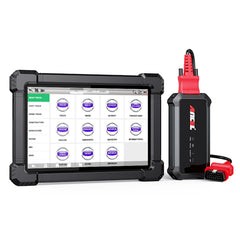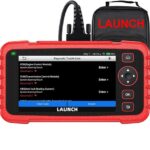Have you ever wondered about the intricate systems operating within the robust frame of a diesel truck? These workhorses of the road are more than just bigger vehicles; they are complex machines built for power and endurance. Just like modern cars, diesel trucks also incorporate sophisticated diagnostic systems. One common question that arises when discussing vehicle diagnostics is: Do Diesel Trucks Have Obd2? Let’s delve into the world of on-board diagnostics and explore their presence in heavy-duty diesel trucks.
OBD2: Your Vehicle’s Health Monitor
Before we tackle the specifics of diesel trucks, it’s essential to understand what OBD2 is. OBD2, short for On-Board Diagnostics version 2, is a standardized system implemented in vehicles to monitor and report on various aspects of their performance and health. Think of it as a built-in doctor for your vehicle, constantly checking vital signs and alerting you to any potential issues. This system is crucial for mechanics and vehicle owners alike, providing valuable insights into engine performance, emissions, and other critical systems.
OBD2 was made mandatory in passenger cars in the United States starting in 1996, and it has since become a global standard. It utilizes a standardized connector and a set of diagnostic trouble codes (DTCs) that allow scanners to communicate with the vehicle’s computer and retrieve information. This standardization simplifies vehicle diagnostics, making it easier to identify problems and perform necessary repairs.
The Presence of OBD2 in Diesel Trucks
Now, back to our main question: Do diesel trucks have OBD2? The answer is nuanced. While heavy-duty diesel trucks are not legally mandated to have OBD2 systems in the same way passenger cars are, many modern diesel trucks do incorporate OBD2 or OBD2-like systems.
The adoption of on-board diagnostics in diesel trucks is driven by several factors:
- Emissions Regulations: Diesel engines, especially in heavy-duty applications, are subject to stringent emissions regulations. OBD systems help ensure these trucks are running cleanly and efficiently, monitoring components like the diesel particulate filter (DPF) and selective catalytic reduction (SCR) systems.
- Performance Monitoring: Trucking companies and operators benefit significantly from the performance data provided by on-board diagnostics. OBD2 systems can track fuel efficiency, engine load, and other parameters that are crucial for optimizing operations and reducing costs.
- Maintenance and Repair: OBD2 systems streamline the diagnostic process for diesel trucks, just as they do for cars. Quickly identifying fault codes and accessing real-time data saves time and reduces downtime, which is critical in the trucking industry.
- Advanced Engine Technology: Modern diesel engines are highly sophisticated, incorporating electronic controls for fuel injection, turbocharging, and other systems. OBD2 systems are well-suited to monitor these complex electronic controls.
However, it’s important to note that even when diesel trucks have diagnostic ports that resemble OBD2 connectors, standard OBD2 scanners designed for passenger cars may not be fully compatible. This is where the complexity arises.
Compatibility Challenges: Heavy-Duty vs. Light-Duty OBD2
While the physical connector might look the same, the communication protocols and diagnostic codes used in heavy-duty diesel trucks can differ significantly from those in light-duty gasoline vehicles. Think of it like different dialects of the same language. Both are forms of OBD, but they “speak” different languages electronically.
Here’s why standard OBD2 scanners often fall short when diagnosing diesel trucks:
- Different Protocols: Heavy-duty trucks may use different communication protocols than passenger cars. While OBD2 mandates certain protocols, heavy-duty vehicles sometimes utilize proprietary or industry-specific protocols in addition to or instead of the standard ones.
- Unique Diagnostic Codes: Diesel trucks have their own set of diagnostic trouble codes that are specific to their engines, transmissions, and braking systems. Standard OBD2 scanners may not have the database to interpret these heavy-duty specific codes.
- System Complexity: Heavy-duty diesel trucks often have more complex electronic systems, including advanced engine management, transmission control, and after-treatment systems. Diagnosing these systems requires more specialized tools and software.
[
The Solution: Specialized Heavy-Duty Truck Scanners
To effectively diagnose diesel trucks, especially those in the heavy-duty category, you need a specialized heavy-duty truck scanner. These scanners are designed to overcome the compatibility challenges mentioned earlier.
Tools like the Ancel X7HD Heavy Duty Truck Diagnostic Tool are engineered specifically to communicate with the diverse range of systems found in diesel trucks. They come equipped with:
- Extensive Protocol Support: These scanners support a wider array of communication protocols, including those commonly used in heavy-duty vehicles, beyond just the standard OBD2 protocols.
- Comprehensive Diagnostic Code Database: They contain a vast database of diagnostic trouble codes for various heavy-duty truck manufacturers and systems, enabling accurate interpretation of fault codes.
- Advanced Diagnostic Functions: Heavy-duty scanners often offer advanced functions beyond basic code reading and clearing, such as live data streaming, component testing, and actuation, which are crucial for in-depth diagnostics.
- Coverage for Multiple Systems: They are capable of diagnosing not only the engine but also other critical systems in diesel trucks, including the transmission, ABS, braking systems, chassis, and body control modules.
The Ancel X7HD, for example, acts as a dedicated translator for your diesel truck’s diagnostic language. It can decipher the unique codes and provide you with clear, actionable information about your truck’s health, presented in an easy-to-understand format. This empowers mechanics and truck owners to accurately diagnose issues and perform necessary maintenance efficiently.
Conclusion: OBD2 and Diesel Trucks – A Need for the Right Tools
In conclusion, while many diesel trucks do incorporate OBD2 or OBD2-like systems for on-board diagnostics, standard OBD2 scanners designed for passenger cars are often insufficient for comprehensive diagnosis. The complexity of heavy-duty diesel truck systems and the variations in communication protocols and diagnostic codes necessitate the use of specialized heavy-duty truck scanners.
Investing in a professional-grade heavy-duty scanner like the Ancel X7HD is crucial for anyone involved in maintaining or repairing diesel trucks. It ensures accurate diagnostics, reduces downtime, and ultimately contributes to the efficient and reliable operation of these vital vehicles. So, while diesel trucks may “have OBD2” in some form, remember that unlocking their diagnostic potential requires the right tools for the job.
FAQs
Q1: Can I use a regular OBD2 scanner on my diesel truck?
It depends on the truck. Some newer, lighter-duty diesel trucks might be partially compatible with standard OBD2 scanners for basic engine codes. However, for comprehensive diagnostics, especially on heavy-duty trucks and for systems beyond the engine, a specialized heavy-duty truck scanner is generally required.
Q2: Are heavy-duty truck scanners difficult to use?
Modern heavy-duty truck scanners like the Ancel X7HD are designed with user-friendliness in mind. They typically feature intuitive interfaces, color screens, and clear instructions. While they offer advanced capabilities, basic functions like reading and clearing codes are straightforward to perform.
Q3: What are the benefits of using a heavy-duty truck scanner?
Heavy-duty truck scanners provide numerous benefits, including: accurate diagnosis of complex systems, faster repair times, reduced downtime, access to comprehensive vehicle health data, and the ability to perform advanced functions like component testing and live data analysis, ultimately saving time and money in the long run.
Q4: Do all diesel trucks have the same OBD2 port?
Most modern diesel trucks that incorporate diagnostic systems use a 16-pin diagnostic connector that resembles the standard OBD2 port. However, the internal wiring and communication protocols can vary significantly, highlighting the need for scanners designed for heavy-duty applications.

